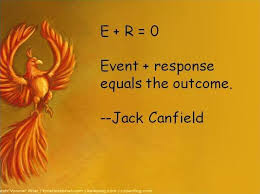As an operations professional, I enjoy learning new ways to get work done more efficiently, or improve my perspective on work/life balance. As Jack Canfield defines in his book, The Success Principles: How to Get from Where You Are to Where You Want to Be (New York: Harper Collins Publishers, 2004), your success can be improved with a simple formula, Event + Response = Outcome, or E+ R = O.

AN ENDURING INVESTMENT PHILOSOPHY
Investing is a long-term endeavor. Indeed, people will spend decades pursuing their financial goals. But being an investor can be complicated, challenging, frustrating, and sometimes frightening. This is exactly why, as David Booth says, it is important to have an investment philosophy you can stick with, one that can help you stay the course.
This simple idea highlights an important question: How can investors, maintain discipline through bull markets, bear markets, political strife, economic instability, or whatever crisis du jour threatens progress towards their investment goals?
Over their lifetimes, investors face many decisions, prompted by events that are both within and outside their control. Without an enduring philosophy to inform their choices, they can potentially suffer unnecessary anxiety, leading to poor decisions and outcomes that are damaging to their long-term financial well-being.
When they don’t get the results they want, many investors blame things outside their control. They might point the finger at the government, central banks, markets, or the economy. Unfortunately, the majority will not do the things that might be more beneficial—evaluating and reflecting on their own responses to events and taking responsibility for their decisions.
e+r=o
Some people suggest that among the characteristics that separate highly successful people from the rest of us is a focus on influencing outcomes by controlling one’s reactions to events, rather than the events themselves. This relationship can be described in the following formula:
e+r=o (Event + Response = Outcome)
Simply put, this means an outcome—either positive or negative—is the result of how you respond to an event, not just the result of the event itself. Of course, events are important and influence outcomes, but not exclusively. If this were the case, everyone would have the same outcome regardless of their response.
Let’s think about this concept in a hypothetical investment context. Say a major political surprise, such as Brexit, causes a market to fall (event). In a panicked response, potentially fueled by gloomy media speculation of the resulting uncertainty, an investor sells some or all of his or her investment (response). Lacking a long-term perspective and reacting to the short-term news, our investor misses out on the subsequent market recovery and suffers anxiety about when, or if, to get back in, leading to suboptimal investment returns (outcome).
To see the same hypothetical example from a different perspective, a surprise event causes markets to fall suddenly (e). Based on his or her understanding of the long-term nature of returns and the short-term nature of volatility spikes around news events, an investor is able to control his or her emotions (r) and maintain investment discipline, leading to a higher chance of a successful long-term outcome (o).
THE FOUNDATION OF AN ENDURING PHILOSOPHY
An enduring investment philosophy is built on solid principles backed by decades of empirical academic evidence. Examples of such principles might be: trusting that prices are set to provide a fair expected return; recognizing the difference between investing and speculating; relying on the power of diversification to manage risk and increase the reliability of outcomes; and benchmarking your progress against your own realistic long-term investment goals.
Combined, these principles might help us react better to market events, even when those events are globally significant or when, as some might suggest, a paradigm shift has occurred, leading to claims that “it’s different this time.” Adhering to these principles can also help investors resist the siren calls of new investment fads or worse, outright scams.
THE GUIDING HAND OF A TRUSTED ADVISOR
Without education and training—sometimes gained from bitter experience—it is hard for non-investment professionals to develop a cogent investment philosophy. And even the most self-aware find it hard to manage their own responses to events. This is why a financial advisor can be so valuable—by providing the foundation of an investment philosophy and acting as an experienced counselor when responding to events.
Investing will always be both alluring and scary at times, but a view of how to approach investing combined with the guidance of a professional advisor can help people stay the course through challenging times. Advisors can provide an objective view and help investors separate emotions from investment decisions. Moreover, great advisors can educate, communicate, set realistic financial goals, and help their clients deal with their responses even to the most extreme market events. In the spirit of the e+r=o formula, good advice, driven by a sound philosophy, can help increase the probability of having a successful financial outcome.
Author: Rob Siegmann is a partner and chief operating officer of Total Wealth Planning, a fee-only fiduciary financial planning firm in Cincinnati (Blue Ash), Ohio. He is often quoted in industry publications such as The Cincinnati Business Courier, Wall Street Journal, Yahoo finance, Financial Planning Magazine, Cincinnati Enquirer as well as others. Rob is grateful to serve others, including his team of CERTIFIED FINANCIAL PLANNER™ practitioners and the clients they serve, so they can live their greatest life through well informed and prudent financial decisions. Rob can be reached at rsiegmann@twpteam.com.







